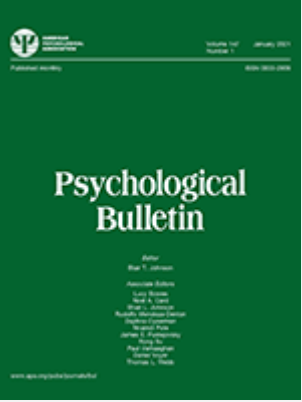与年龄相关的儿童期情绪识别变化:荟萃分析综述。
IF 19.8
1区 心理学
Q1 PSYCHOLOGY
引用次数: 0
摘要
儿童准确识别周围人发出的外部情绪信号的能力是其社会情感发展的一个里程碑,并与许多重要的社会心理结果有关。大量的个别研究探讨了儿童在成长过程中何时以及以何种顺序获得情绪知识。然而,很少有人尝试对这些研究进行量化总结。为了解决这个问题,本荟萃分析研究了儿童期与年龄相关的情绪识别轨迹,以及典型发育期儿童对外部情绪线索(面部、声音和身体)的识别在多大程度上受参与者、任务和刺激相关因素的影响。我们分析了儿童的整体情绪识别能力(与特定情绪类别无关)和特定基本情绪识别能力。在我们的分析中,共纳入了 k = 129 项单项研究,调查了 N = 31,101 名 2-12 岁儿童的情绪识别能力。在所有情绪类别中,儿童的识别准确率都明显高于正常水平,而且随着年龄的增长,所有情绪的识别准确率都有相同程度的提高。情绪识别准确率还受研究地区和任务类型的影响。儿童熟练识别特定情绪的顺序与之前的定性研究结果一致:快乐是最容易识别的情绪,而厌恶和恐惧则是最难识别的情绪。与任务和刺激相关的调节变量也以不同的方式影响着特定的情绪类别。我们将这些结果与更广泛的儿童社会情感发展联系起来,并讨论如何利用我们的发现来指导对儿童社交技能感兴趣的研究人员和从业人员。(PsycInfo Database Record (c) 2024 APA, 版权所有)。本文章由计算机程序翻译,如有差异,请以英文原文为准。
Age-related changes in emotion recognition across childhood: A meta-analytic review.
Children's ability to accurately recognize the external emotional signals produced by those around them represents a milestone in their socioemotional development and is associated with a number of important psychosocial outcomes. A plethora of individual studies have examined when, and in which order, children acquire emotion knowledge over the course of their development. Yet, very few attempts have been made to summarize this body of work quantitatively. To address this, the present meta-analysis examined the age-related trajectories of emotion recognition across childhood and the extent to which typically developing children's recognition of external emotional cues (in the face, voice, and body) is influenced by a host of participant-, task-, and stimulus-related factors. We analyzed children's emotion recognition overall (independent of specific emotion categories) and for specific basic emotions. In total, k = 129 individual studies, investigating a total of N = 31,101 2-12-year-old children's emotion recognition abilities were included in our analyses. Children's recognition accuracy across all emotion categories was significantly above chance and improved with age in the same manner for all emotions. Emotion recognition accuracy was also moderated by region of study and task type. The order in which children became proficient at identifying specific emotions was consistent with previous qualitative reviews: Happiness was the easiest emotion to recognize, and disgust and fear were the most difficult to recognize across age. Task- and stimulus-related moderator variables also influenced specific emotion categories in different ways. We contextualize these results with regard to children's socioemotional development more broadly, and we discuss how our findings can be used to guide researchers and practitioners interested in children's social skills. (PsycInfo Database Record (c) 2024 APA, all rights reserved).
求助全文
通过发布文献求助,成功后即可免费获取论文全文。
去求助
来源期刊

Psychological bulletin
医学-心理学
CiteScore
33.60
自引率
0.90%
发文量
21
期刊介绍:
Psychological Bulletin publishes syntheses of research in scientific psychology. Research syntheses seek to summarize past research by drawing overall conclusions from many separate investigations that address related or identical hypotheses.
A research synthesis typically presents the authors' assessments:
-of the state of knowledge concerning the relations of interest;
-of critical assessments of the strengths and weaknesses in past research;
-of important issues that research has left unresolved, thereby directing future research so it can yield a maximum amount of new information.
 求助内容:
求助内容: 应助结果提醒方式:
应助结果提醒方式:


